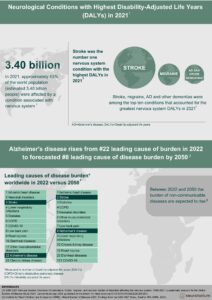Diabetes and Alzheimer’s disease may share risk factors, including overlapping metabolic risk factors. Apolipoprotein E (APOE) also regulates lipid metabolism.1 This suggests that the aetiology of AD includes metabolic risk factors, which are also involved in the development of diabetes.2 Hyperglycaemia is the main characteristic of impaired glucose tolerance and diabetes,3 with evidence that hyperglycaemia is a potential risk factor for the development of cognitive dysfunction and dementia.4
Learn more about diabetes and Alzheimer’s disease





